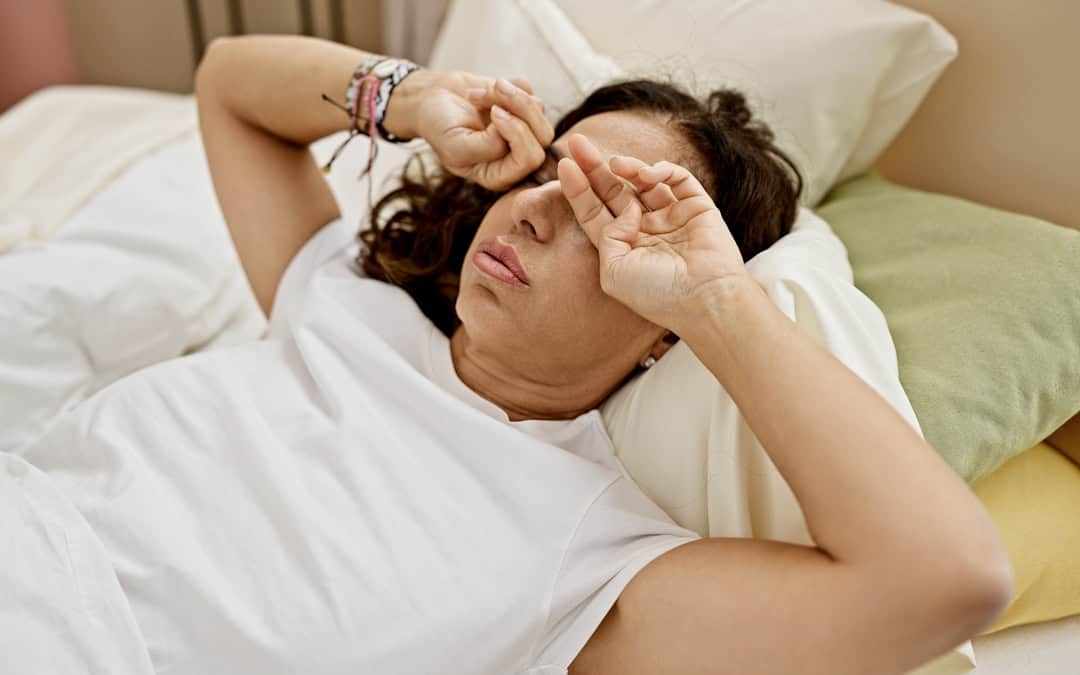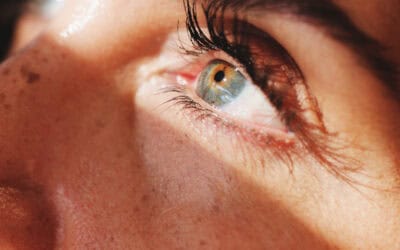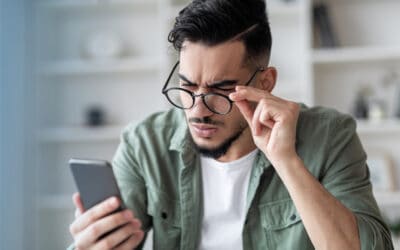Can lack of sleep cause dry eyes? Research that included over 250,000 people spanning over eight years in China found that people with sleep disorders had greater than three times risk of suffering dry eye disease. In fact, there is a stronger link than most people realize between the rest you get each night and how your eyes feel the next day.
Studies show that individuals with poor sleep quality are more likely to experience dry eye symptoms compared to those who sleep well. This connection works both ways—patients already suffering from dry eyes are 1.5 times more likely to be poor sleepers. Furthermore, the relationship between dry eyes and lack of sleep exists across all ages and genders.
When researchers examined people with dry eye symptoms, they found that 36.4% had poor sleep quality compared to just 24.8% of those without dry eye issues. The same study noted that almost one-in-two people (44.9%) who experience frequent dry eye symptoms also struggle with poor sleep quality.
Your irritated, gritty eyes paired with restless nights are not separate problems. Rather, these are connected in ways that affect your daily comfort and long-term eye health. Understanding this connection becomes crucial for protecting both your vision and overall wellbeing.
This guide explores why sleep matters for your eyes, which daily habits might be making things worse, and practical steps to improve both your sleep quality and dry eye symptoms.
Why Sleep Matters for Your Eyes
Think of sleep as your eyes’ nightly maintenance program. While you rest, your eyes undergo essential repairs that keep them functioning properly day after day. Without this critical downtime, your eyes struggle to recover from constant focusing, blinking, and protection against environmental hazards.
The role of sleep in eye repair and hydration
During sleep, your eyes enter a restorative phase that’s impossible to achieve while awake. This nighttime recovery process repairs damaged cells and regenerates tissues in and around your eyes. When sleep gets cut short, your eyes have insufficient time to heal from daily wear and tear, potentially setting the stage for long-term problems like glaucoma or macular degeneration.
Your tear production system depends heavily on quality sleep. Throughout the night, your body works to replenish the tear film that keeps your eyes comfortable and protected. Research demonstrates that during deep sleep, oxygen and nutrients flow to your eyes more effectively, reducing inflammation and supporting overall eye health.
Sleep directly controls your tear glands’ ability to produce moisture. The tear production mechanism operates most efficiently when you get adequate rest. Studies reveal a dramatic finding: sleep deprivation can decrease aqueous tear secretion by approximately 50% after just two days of inadequate rest. This reduction compounds with continued poor sleep, creating increasingly severe dry eye symptoms.
Even when your eyes are closed, specialized tears serve important functions. Though tear fluid secretion actually decreases during nighttime eye closure, these protective tears work to cleanse your eye surface throughout the night.
Common signs of dry eyes from lack of sleep
Sleep-deprived eyes send clear warning signals that you shouldn’t ignore. People experiencing sleep-related dry eyes typically notice these symptoms first thing in the morning:
- Dryness, grittiness, and general discomfort upon waking
- Increased sensitivity to light and blurred vision
- Itchiness, redness, and irritation
Sleep loss creates measurable changes in your eye chemistry. Beyond reducing tear production, sleep deprivation makes your remaining tears saltier (hyperosmolar), which irritates your eye surface even more. Your corneas become markedly more sensitive after just two days of poor sleep, and this heightened sensitivity can persist for extended periods.
The numbers tell a concerning story: people who sleep less than 5 hours nightly face a 20% higher risk of developing dry eye compared to those getting 6 or more hours of rest. Each additional night of poor sleep compounds these problems, with eye changes becoming more pronounced over time.
Everyday Habits That Harm Sleep and Eye Health
Your daily routines might be working against both restful sleep and comfortable eyes. These common behaviors create a cycle where poor sleep worsens dry eyes, and eye discomfort makes quality sleep even harder to achieve.
Using screens before bed
Scrolling through your phone or watching TV before sleep disrupts your body’s natural rhythm. Studies show that blue light from screens suppresses melatonin production by up to 90 minutes compared to dim lighting. This delay doesn’t just make falling asleep harder; it directly impacts your eye health.
Your eyes pay a double price for nighttime screen use. People who use electronic devices regularly at night often receive insufficient high-quality sleep and typically feel more tired the next day. These devices also cause you to blink less frequently, worsening dryness and eye irritation.
Sleeping with contact lenses
Falling asleep with contacts creates perfect conditions for serious eye infections. This habit increases your risk of eye infection six to eight times. When you sleep with contacts in, your corneas receive significantly less oxygen and tear fluid since you’re not blinking.
The risk of microbial keratitis, a form of corneal inflammation caused by infection, jumps over five times higher regardless of lens type. These infections can lead to permanent corneal damage and vision loss.
Irregular sleep schedules
Inconsistent sleep patterns disrupt your circadian rhythm, which regulates hormone production affecting eye hydration. Studies indicate that circadian rhythm disruption can induce various health issues including ocular fatigue.
The connection becomes clear when you consider the numbers: people who consistently get less than 5 hours of sleep have a 20% higher risk of developing dry eye syndrome compared to those sleeping 6+ hours.
Poor bedroom environment
Your sleeping environment significantly impacts eye health overnight. High airflow from fans or air conditioning increases moisture loss from your eyes while you sleep. Low humidity levels in your bedroom lead to tear evaporation during the night.
Even minimal light exposure works against your eyes. Nocturnal ambient light exposure of just 5 lux or greater increases ocular fatigue. Proper darkness helps maintain tear production and reduces inflammation that contributes to dry eye symptoms.
How to Improve Sleep and Reduce Dry Eye Symptoms
Simple changes to your daily habits can dramatically improve both your sleep quality and dry eye symptoms. The good news: breaking the cycle of poor sleep and irritated eyes doesn’t require expensive treatments or complicated routines.
Set a consistent sleep routine
Your body’s internal clock thrives on predictability. Establishing regular sleep and wake times helps regulate the hormones that control both sleep quality and tear production. The National Sleep Foundation recommends stopping electronic device use at least one hour before bedtime.
Create a bedtime ritual that includes relaxing activities instead of stimulating screen use. This simple change helps signal your body it’s time to wind down and prepares your eyes for the restorative sleep they need.
Limit screen time before bed
Screen exposure before sleep disrupts your body’s natural sleep-wake cycle. Studies show that looking at brightly lit screens suppresses melatonin production. Extended screen use also leads to reduced blinking, worsening eye dryness.
Follow the 20-20-20 rule throughout the day: every 20 minutes, look at something 20 feet away for 20 seconds. This practice gives your eyes regular breaks from close-up focus while reducing strain that contributes to nighttime dryness.
Use artificial tears or humidifiers
Moisture becomes your eyes’ best friend, especially during sleep:
- Use preservative-free artificial tears throughout the day, especially before sleep
- Install a humidifier in your bedroom to maintain 40-60% humidity levels
- Humidifiers help minimize tear evaporation by increasing moisture content in the air
These steps create an environment where your eyes can maintain proper hydration throughout the night.
Consider blue light blocking glasses
Research on blue light blocking glasses shows mixed results. Some studies indicate these glasses, when worn two hours before bedtime, improved sleep quality. You can also use your device’s night mode or decrease screen brightness in the evening.
Practice eyelid hygiene
Proper eyelid care can also help make a difference. Many dry eye symptoms stem from inadequate eyelid care. Clean your eyelids daily using appropriate cleansers to prevent blockage of meibomian glands that produce essential oils for tear film stability.
This simple routine helps maintain tear production and reduces inflammation that contributes to dry eye symptoms.
When to See a Doctor About Sleep and Eye Issues
Sleep-related eye problems can worsen quickly when left untreated. Recognizing when professional care becomes necessary protects your vision and prevents complications that could affect your eyesight permanently.
Persistent dry eye despite lifestyle changes
When high-quality, over-the-counter lubricant eyedrops don’t resolve your symptoms, it is important to schedule a professional evaluation. Dry eye symptoms that disrupt your daily activities or cause persistent discomfort requires medical attention. These symptoms can worsen over time if left untreated, potentially damaging the front surface of your eye.
Don’t wait for symptoms to worsen. Early intervention often prevents more serious complications and preserves your long-term eye health. Specialists at the Dry Eye Clinic in Pittsburgh at Chang Eye Group will conduct tests and evaluate your symptoms in order to diagnose the root cause of your discomfort.
Signs of sleep apnea or insomnia
Sleep disorders frequently show up as eye problems first. Watch for warning signs including blurry vision that persists throughout the day, eyelid redness or swelling, frequent eye twitching, and increased light sensitivity.
Key sleep apnea symptoms include snoring, excessive daytime sleepiness, witnessed breathing pauses, morning headaches, and waking up choking or short of breath. These symptoms combined with eye problems often signal the need for both sleep and eye care evaluation.
Getting an eye exam in Pittsburgh
Schedule an appointment with Chang Eye Group at one of our convenient locations in Pittsburgh if you experience prolonged signs of dry eyes, including red, irritated, tired or painful eyes. During your exam, your doctor can identify sleep-related eye conditions and check for elevated eye pressure that might indicate glaucoma risk.
Early detection through regular eye exams becomes crucial, as conditions like glaucoma cause irreversible vision loss. Your eye doctor can also determine whether your symptoms stem from sleep issues, environmental factors, or underlying eye disease requiring different treatment approaches.
Referral to a sleep specialist
Your eye doctor may recommend evaluation by a sleep specialist if they suspect sleep apnea contributes to your eye issues. The vascular consequences of sleep apnea create common eye manifestations that require coordinated care. Even if CPAP therapy causes some eye irritation, continue using your machine as prescribed while discussing eye-protection options with your doctor.
Remember that addressing both sleep and eye health together often produces better outcomes than treating either condition alone.
Protecting Your Eyes Through Better Sleep
The connection between sleep quality and dry eyes affects millions of people, yet most don’t realize how closely these two health concerns intertwine. Your eyes need proper rest just as much as the rest of your body. Each night of insufficient sleep compounds eye dryness issues, while existing dry eye conditions make restful sleep harder to achieve.
The good news: Simple lifestyle adjustments can break this cycle and protect both your vision and sleep quality.
Establishing consistent sleep schedules supports your body’s natural rhythms and helps maintain proper tear production. Creating a bedroom environment that protects eye moisture with controlled airflow and humidity can help make a measurable difference in how your eyes feel each morning. Most importantly, reducing screen time before bed benefits both sleep quality and eye hydration.
Many people underestimate how everyday habits affect their eye health. Practicing proper eyelid hygiene and using preservative-free artificial tears can significantly reduce dry eye symptoms. These changes might seem small individually, but together they create powerful protection for your eyes.
Don’t wait for symptoms to worsen. Get professional attention if you are experiencing persistent dry eye symptoms, especially if they interfere with your daily activities or sleep. Your eye doctor can identify underlying issues and recommend treatments that go beyond home remedies.
Remember that protecting your vision starts with understanding how quality rest affects optimal eye health. The steps you take today to improve your sleep habits will benefit your eyes for years to come.
If you’re experiencing ongoing dry eye symptoms or sleep-related eye issues, schedule an appointment with Chang Eye Group in Pittsburgh. Our experienced eye doctors can help you develop a treatment plan that addresses both your eye comfort and overall health.
FAQs
Q: How does sleep affect dry eye symptoms?
A: Poor sleep quality is strongly linked to dry eye symptoms. Studies show that individuals who sleep poorly are about 50% more likely to experience dry eyes compared to those who sleep well. Lack of sleep can reduce tear production by up to 50% after just two days, leading to increased dryness, irritation, and discomfort in the eyes.
Q: Can using screens before bed worsen dry eye symptoms?
A: Yes, using screens before bedtime can exacerbate dry eye symptoms. The blue light emitted by electronic devices suppresses melatonin production, making it harder to fall asleep. Additionally, screen use causes reduced blinking, which can worsen eye dryness and irritation. It’s recommended to stop using electronic devices at least 30 minutes before bedtime.
Q: What are some effective ways to improve sleep and reduce dry eye symptoms?
A: To improve sleep and reduce dry eye symptoms, establish a consistent sleep routine, limit screen time before bed, use preservative-free artificial tears, install a humidifier in your bedroom, and practice proper eyelid hygiene.
Q: When should I see a doctor about sleep-related eye issues?
A: You should consult an eye doctor if you experience persistent dry eye symptoms despite lifestyle changes, if over-the-counter lubricant eyedrops don’t resolve your symptoms, or if dry eye disrupts your daily activities. Additionally, seek medical attention if you notice signs of sleep apnea or insomnia, such as excessive daytime sleepiness, morning headaches, or frequent eye twitching.
Q: Is there a connection between sleep disorders and eye health?
A: Yes, there is a significant connection between sleep disorders and eye health. For instance, people with obstructive sleep apnea are approximately 10 times more likely to develop glaucoma. Sleep disorders can manifest as eye problems, including blurry vision, increased light sensitivity, and eyelid redness or swelling. Regular eye exams can help detect sleep-related eye conditions early.






